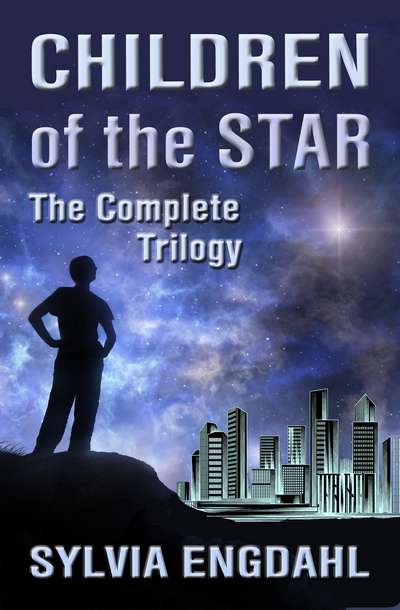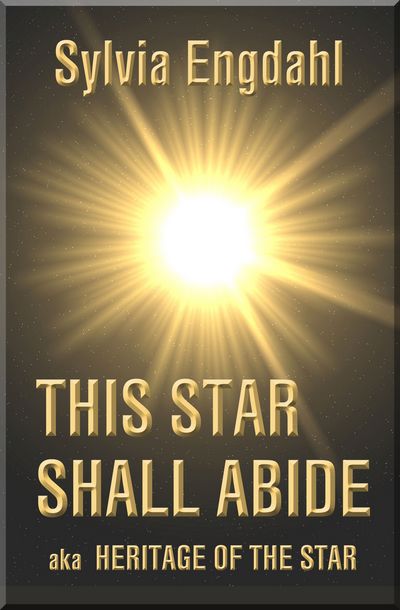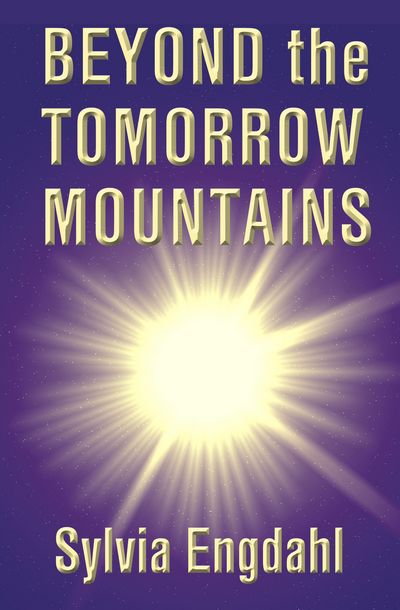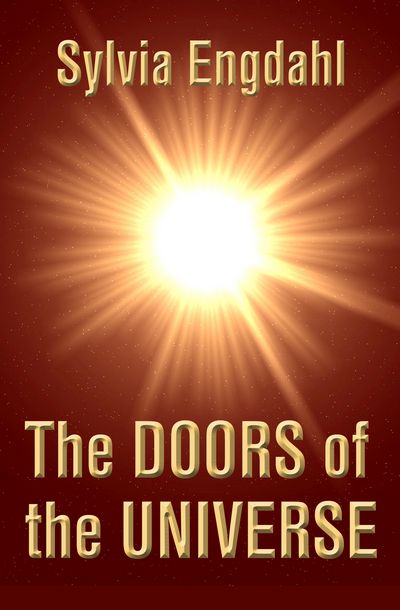Frequently Asked Questions
You've said that you don't want people today to read the
first two volumes of the trilogy without going on to the third--even
though they were originally published years before the third. Why
don't you?
Because the justification in those two novels for the Founders'
actions is not completely valid in the light of today's knowledge.
(This issue is discussed in more detail below.)
I used to say that the three would never be published separately again.
However, I have since decided that an Afterword at the end of This Star Shall
Abide can make plain that the story is not finished without spoiling the suspense
of the later books. I found that many potential readers hesitated to choose a book as
long as the single-volume edition, and in any case the first book can be enjoyed by
younger readers than the others. Some middle-school teachers wanted to use it in
their classes, yet didn't want to buy the whole trilogy.
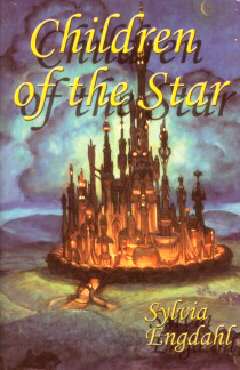
Meisha Merlin edition (2000) |
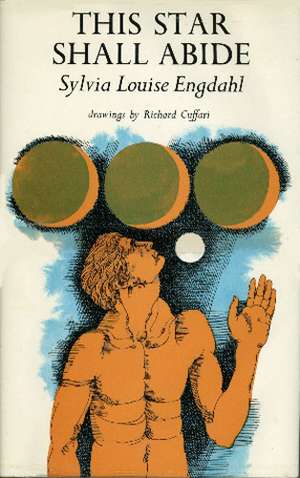
Athenuem edition (1972) |
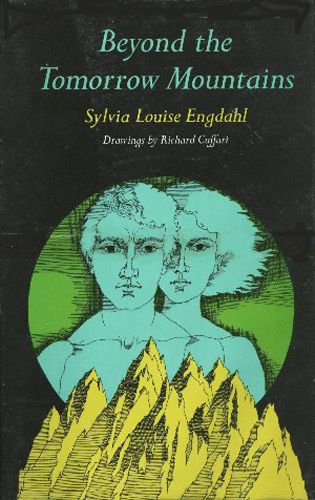
Athenuem edition (1973) |
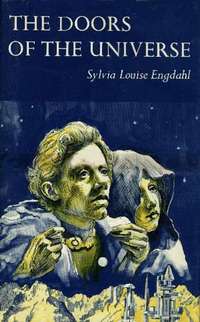
Athenuem edition (1981) |
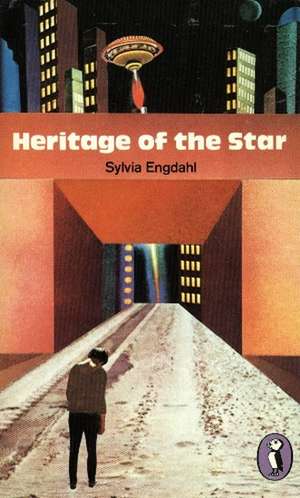
British paperback edition (1976) |
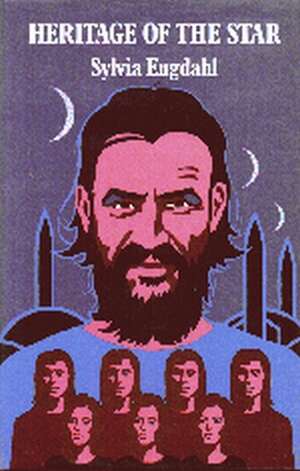
British hardcover edition (1973) |
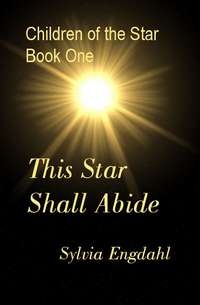
2008 (ebook) and 2010 (pb) covers |
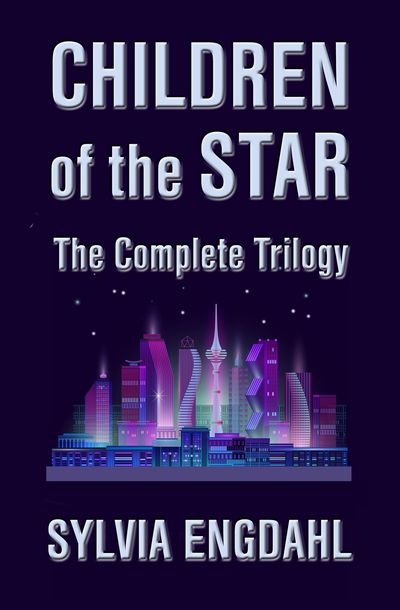
2021 cover |
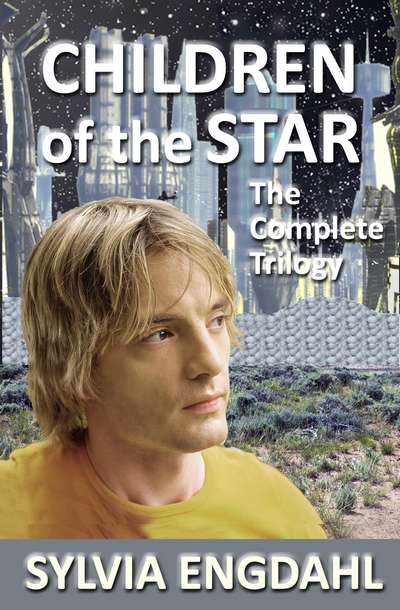
2019 cover |
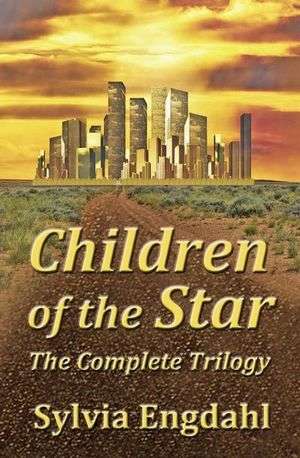
2015 cover |
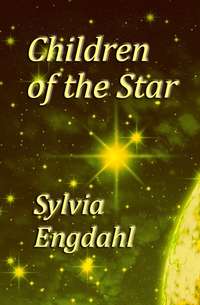
2012 cover |
Some readers felt that the second and third volumes of the
trilogy, Beyond the Tomorrow Mountains and The Doors of the
Universe, should have been issued as adult novels in the first
place--they are slower moving than your other books and are more difficult
even for advanced YA readers. If you wanted a YA audience, why did you
write them that way?
For one thing, it was a requirement of the original publisher that each
volume be independently understandable, so I had to repeat background
information in the later ones that some readers of This Star Shall
Abide were bored by. Mainly, however, the second and third books seem
"slower" than the first because they deal with more mature themes--the
third novel is, in fact, about Noren as an adult. The outcome of the
story demanded this, yet since the first novel had appeared as a YA
book, the others had to be issued as YA also, although they were never
meant for kids below high school age. I wouldn't have chosen to cut the
introspective parts of the story--which do appeal very strongly to some
readers--in order to attract others; then it wouldn't have pleased
anyone! My books have never pretended to be action-adventure fiction.
Why is only This Star Shall Abide being reprinted separately?
Because there is a much greater demand for books appropriate for
middle-school age readers than books for older teens. (At least this was true until recently,and recent YA novels focus more on romance than mine do.) The second andthird novels will remain available indefinitely as ebooks, audiobooks and in the single-volume paperback edition of the trilogy, so anyone who wants to know how the story turns out can read them.
Why did This Star Shall Abide appear under the title Heritage
of the Star in the UK?
Because the British publisher didn't happen to like the original title and thought
a different one would sell better. This often happens when an American book is
reprinted in the UK, and vice versa.
Incidentally, the titles for the three novels, and also the trilogy as a whole, are
all phrases taken from one paragraph of the Prophecy:
“There shall come a time of great exultation, when the doors
of the universe shall be thrown open and everyone shall rejoice. And at that
time, when the Mother Star appears in the sky, the ancient knowledge shall be
free to all people, and shall be spread forth over the whole earth. And Cities
shall rise beyond the Tomorrow Mountains, and shall have Power, and Machines;
and the Scholars will no longer be their guardians. For the Mother Star is our
source and our destiny, the wellspring of our heritage; and the spirit of this
Star shall abide forever in our hearts, and in those of our children, and our
children’s children, even unto countless generations. It is our guide and
protector, without which we could not survive; it is our life’s bulwark. And so
long as we believe in it, no force can destroy us, though the heavens
themselves be consumed! Through the time of waiting we will follow the Law; but
its mysteries will be made plain when the Star appears, and the children of the
Star will find their own wisdom and choose their own Law.”
You stated in an Author's Note to the original edition of Beyond the
Tomorrow Mountains that the people of the trilogy aren't descended from people of
Earth, although some readers of This Star Shall Abide assumed that they were.
Why did you think it was important to clarify this?
Because I didn't want to imply that all the traditional religions
of Earth will be forgotten by future colonists. Not only might that have
offended some readers, but it wouldn't fit the story; a new religion
developed by our descendants wouldn't have quite the same characteristics
as the one of Noren's planet.
There is also another reason. All my fiction takes place in the same "universe"--ours,
as I imagine it may someday be, though of course the details aren't meant to be predictions.
To picture the events in Children of the Star as happening to our descendents would
settle the question of whether Elana's people in Enchantress from the Stars are our
descendents or visitors to our ancestors, which is intended to be an open question that could
be answered either way. Moreover, it wouldn't be consistent with my later novels, which are
about the future of Earth and its colonies in other solar systems.
I originally thought by describing the home civilization in the story as "the Six Worlds"
and stating that there were six all very similar to each other in that solar system, it
would be clear that it wasn't ours; but the reviewers of This Star Shall Abide,
some of whom weren't knowledgeable about astronomy, didn't all see that.
Is the the story intended to comment on attitudes toward religion on Earth?
Different readers interpret it in different ways. I have received mail from people of
many different religions, including members of the clergy, who admire it; and it won a
Christopher award for "affirmation of the highest values of the human spirit" from a
Catholic organization (though I am not Catholic). On the other hand, several atheists
have interpreted it as an endorsement of their views. What I was actually trying to say about
religion becomes clearer in the second and third volumes of the story, and I have made more
comments on this in the part of this FAQ that deals with them.
What revisions did you make in the 2000 edition?
The main thing I changed was some of what was said about computers. I
wrote the books before desktop computers existed, based on my own experience
with real-time systems in the late 50s and early 60s. I'm amazed that I got
as much right as I did--for instance, I guessed networked computers could
replace a large central one--but one crucial point was wrong. I stated that
all the data would be lost if the power were interrupted (which was true of
the computers I'd worked with; our only external storage medium was magnetic
tape, and I couldn't imagine tape having the capacity or reliability to
store a fraction of a civilization's knowledge, certainly not in the hot
climate of that planet). I assumed that truly advanced computers would rely
on immense RAMs. ROMs, CDs and even hard disks didn't occur to me; I had
never heard of such technologies. It is true enough that if power for air
conditioning were lost for a long period, they'd deteriorate, and if the
computers themselves were damaged stored data would be useless in any case,
so the premise that knowledge would be lost without preservation of the City
is valid. But I've taken out the remarks about the disastrous effect of
momentary power loss and the statement that the networking was originally
implemented without turning off the power to any of the computers involved.
Another thing that was outdated was phrasing that now sounds sexist,
such as many references to the survival of "man" and "mankind." Personally
I think these are perfectly good words that don't imply male more than
female (after all, "human" and even "woman" contain "man") any more than
they imply our own species as distinguished from the hypothetical "human"
species of the story. But I have given in to today's majority opinion
because I don't want anybody to read in implications that I didn't intend.
Incidentally, when I replaced "the sons of men will find their own wisdom"
with "the children of the Star will find their own wisdom" in the Prophecy,
that gave me the idea for the title of the omnibus edition.
I've also tried to make clearer that although the culture of the
villagers in the story is sexist, that of the City is not. What did the
feminist reviewers who objected to sexism in the books expect of a society
that had reverted to backward ways? One theme of the story is that the loss
of technology leads to loss of everything else that goes with advancement,
including attiudes toward equality--furthermore, village women necessarily
devote most of their time to childrearing since large families are need to
increase the planet's population. So of course they have sexist customs.
I no more advocate this than I advocate their custom of lynching heretics!
Finally, for the single-volume edition, I cut some of the explanations that
were needed to make the second and third novels clear if read independently,
which caused them to be slower moving than would otherwise have been necessary.
The story is better when read as an integrated whole, though the cuts have been
retained in the separate ebook editions.
Why did the lack of metal on Noren's planet completely rule out
the possibility of developing high technology? Couldn't there have
been more technology based on plastics, glass and ceramics?
The problem with plastics is that in order to produce them you need more
than the raw materials; you need metal equipment and you need a power
source, which in turn requires metal machinery, because they're molded
using high heat and/or high pressure. The same for glass--presumably the
villagers know how to make it, but they don't have anything that will burn
hot enough to melt it, or cauldrons that can stand the heat. And they
can't fire ceramics for the same reason; they're limited to unfired
pottery.
Aren't some of Noren's reactions in the first two novels rather
adolescent?
Certainly they are! Noren is an adolescent--I pictured him as
about 16 at the beginning in terms of our years, which couldn't be
stated since the setting isn't Earth or an Earth colony. To my surprise,
some readers assumed he was older and then felt his reactions weren't
mature enough.
Isn't he too serious for a teenager?
If you'd grown up in a society like his and undergone the experiences
he does, you'd have been serious at 16! Anyway, teenagers are underestimated
by our society; many are more serious than they're given credit for, and
a lot of them are disturbed by serious issues. A teenager came up to me
in a library once and said of Beyond the Tomorrow Mountains, "Noren
really tripped out, didn't he?" She didn't seem puzzled as to why.
The rest of this FAQ contains major spoilers!
You don't want to look at it until you have already read all three novels:
This Star Shall Abide (aka
Heritage of the Star), Beyond the
Tomorrow Mountains, and
The Doors of the Universe.
Skip to an
excerpt from Book One.
Why did The Doors of the Universe appear so long after
the first two volumes of the trilogy?
Originally I didn't plan to write more than two volumes. The story was
about faith in the face of impossible odds; I didn't want to weaken it by
letting Noren single-handedly and unrealistically save his people.
Furthermore, I had no idea what could save them; I'd done such a good job
of making survival in their world impossible (because under no other
circumstances would I have justified their bad social setup) that there
wasn't any solution, or so I thought.
However, years after the second volume's publication, in the course of
writing a nonfiction book about genetic engineering, it dawned on me, to my
dismay, that I had been mistaken. I had known nothing whatsoever about
genetics until I began to research it; once knowledgeable, I realized that
there was no good reason why genetic engineering could not have enabled
Noren's people to survive. This appalled me, because I feared that now
genetic engineering was being talked about, new readers might assume I'd
simply ignored it for plot purposes and justified the social evils in the
story on false grounds. So I knew I had to write another volume. The
uncanny thing was that after I finished it, the story was obviously better
as a trilogy and seemed as if it had been planned that was all along--many
things in the first two novels looked even to me as if they had been
"planted" for their relevance to the third! What still bothers me is that
many of the original readers may never have learned that a third exists.
In the final Epilogue, Noren developed trees through genetic
engineering--at least the people could have had wood and paper. So why
would their civilization's knowledge been lost if no metal source had been
found?
The amount of knowledge in a spacefaring civilization's computers would
far exceed the size of all our print libraries on Earth, and in any case
paper deteriorates in time--especially in a hot climate and a corrosive
atmosphere such as the planet had. As to wood, I slipped in the Epilogue
by not making clear that the trees had thin, weak trunks and thus weren't
good for much except shade (having already written about metal being
obtained, I didn't notice the implication of my brief statement about
trees; I fixed this in the 2000 edition.) Noren couldn't have continued
genetic engineering after the City was opened and the computers lost, so
wood could never have been obtained.
Why did you write Talyra out of the third book? A lot of readers were
shocked by her death, especially so soon after she and Noren were married.
Isn't the reason obvious? Since Talyra was not a Scholar and could never be told
the secret that made genetic engineering necessary, Noren couldn't possibly have
asked her to participate in experimentation, even if it hadn't been a firm policy that
only Scholars should take risks. And he certainly wouldn't have had a child by
anyone else while married to Talyra.
Why did you decide to combine your two series by letting the
Service from the Elana books meet Noren?
The ultimate, subtle aid provided by the Service was necessary because it
had been firmly established that the planet hadn't enough metal to restore
technology. If the Founders had known what the Service knew about recovering
trace metals (which incidentally, is something that's already been done with
genetically engineered bacteria here on Earth) they would have used that
knowledge in the first place. So, to achieve a happy ending, aliens had to
help without revealing themselves--and if there was going to be an alien
federation with the same policy as the in the Elana books, there'd have been
no point in making it a different one. Furthermore, having established the
presence of an alien artifact in the previous book, I had to follow it up.
Concerning that artifact, you've said you have trouble thinking
up action for stories--is that why you had to resort to what some felt was
a coincidental and contrived rescue at the end of Beyond the Tomorrow
Mountains?
Ironically, no. The discovery of the alien artifact, which one reviewer
called "deus ex machina," was meant to imply that coincidences occur that
aren't just due to chance--synchronicity, if you will. Or you can call it
divine providence. That was the point, after all. How could the book have
ended as it does if the rescue had not been unforeseeable through reason?
(This was one of the remarkable cases in which the way for the concluding
novel turned out to have been prepared, because the arrival of the Service
depended on the artifact's discovery, and that, too, needed to be not
merely unforeseen but unforeseeable; otherwise the actions of the
Scholars would have been unjustified.)
Are you saying the story is about actual religious faith, not
just ethical issues?
Of course it is--to a much greater extent than I realized when I
originally conceived the first novel (which was inspired by the issue of
adolescent rebellion in general). Some readers apparently think it isn't,
merely because the religion portrayed isn't like their own.
But isn't the religion in the story a false religion?
Individual readers may, of course, consider any religion other than
their own "false." But when people speak of a "false religion" in the
context of this trilogy, or of any science fiction, they usually mean
something more like "fake religion." Did the mere fact that its central
symbol, the Mother Star, was purposely chosen by the First Scholar make
it fake? Or the fact that the Star didn't really have supernatural
power and that what people said about it wasn't literally true? Those
are questions readers will have to answer for themselves after reading
the second and third novels.
Personally I believe that many religious ideas are metaphors that
cannot be taken as literal fact, but nevertheless express concepts that
we have no better way of expressing. As Noren discovered, they are
symbols of "the unknowable." Metaphor often conveys truth, and is in
fact the only way of conveying truth beyond our rational understanding.
To me, it is what the metaphor stands for that's important.
Still, to readers who don't have any religious faith of their
own, it looks as if the outcome of Beyond the Tomorrow Mountains
depends too much on coincidence. Why did you write yourself into such
a corner?
Because neat story plotting isn't how things happen in real life. I
deliberately set up a situation that demanded hard work and sacrifice on
the part of the characters, yet could not be completely solved by them.
The issues here weren't all religious by any means. In the late 60s and
early 70s (and to a lesser extent today) young people tended to believe
that all our world's evils could be eliminated overnight if only everybody
would try hard enough. Also, they--and many adults--tend to believe that
if we can't predict the future to the extent of making reliable plans for
reversing dangerous trends, we're headed for disaster. I do not believe
that is true. Since we are not omniscient, things we can't foresee are
always going to come along.
Wouldn't a less than happy ending have been even more true
to life?
Not in my opinion. Some readers have assumed that the happy ending
was necessitated by the books having been originally published as YA
instead of adult novels. This wasn't the case; I wouldn't write even
an adult novel with a tragic outcome for a whole civilization. An open
ending, yes, as I did when I planned to conclude with Beyond the
Tomorrow Mountains, but not outright disaster. And unlike some readers
I've talked to, I believe the permanent loss of high technology would
be a disaster that would lead ultimately to the species' extinction,
even if its survival had been prolonged. I don't agree with the the view
that a primitive low-tech lifestyle can be indefinitely sustained, and
in any case I believe that no species can last forever if confined
to a single planet. The restoration of interstellar travel was essential
to the long-term survival of Noren's people, just as the development of it
is essential to ours (see my essay
Space and Human Survival).
If the religious aspects of the story are to be taken
seriously, then doesn't it say that there's no incompatibility between
religious values and genetic engineering of humans?
Yes, Noren's simultaneous service as innovative priest and genetic
engineer was meant to imply it. I'm not opposed to genetic engineering--or
even to human cloning--assuming that techniques are first thoroughly proven
and experimentation follows the ethical rules applying to all medical
research. (Although I don't think it will be safe to try with humans,
except for cure of a few genetic diseases, in the foreseeable future,
because not nearly enough is understood at present about the regulation
of genes and the extent to which their combination, as distinguished
from the presence of individual genes, affects human characteristics.)
I believe there's more to human beings than their genes--which we need
more genetic research to demonstrate.
